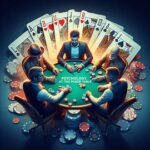In the intricate dance of casino poker, where strategy and skill meet the unpredictability of the draw, the ability to maintain a poker face is invaluable. Emotions at the Table A poker face—impassive, unreadable, and composed—can be as crucial to your success as the cards you’re dealt. This article provides winning tips for perfecting your poker face, mastering your emotions, and enhancing your presence at the table, ensuring you’re not giving anything away to your opponents.
Understand the Importance of a Poker Face
The foundation of a strong poker game lies not just in the hands you play, but in how you play them—emotionally and psychologically. An effective poker Emotions at the Table face masks your true feelings about your hand, making it difficult for opponents to gauge whether you’re bluffing, holding a strong hand, or somewhere in between. This ambiguity can lead to opponents making mistakes, giving you a significant edge.
Master Your Physical Tells
Physical tells—unconscious behaviors and reactions—can betray your inner thoughts and emotions. Common tells include changes in breathing patterns, facial expressions, and even the way you stack your chips. Begin by becoming aware of your natural reactions Emotions at the Table during different game situations. Practice in front of a mirror or record yourself playing to identify and learn to control these tells.
Control Your Emotional Responses
Poker can be a rollercoaster of emotions, from the thrill of a winning hand to the disappointment of a bad beat. Learning to manage these emotional highs and lows is key to maintaining a steady poker face. Techniques such as deep breathing, mindfulness, and positive self-talk can help stabilize your emotions, preventing them from reflecting in your demeanor.
Use Misdirection to Your Advantage
While the ultimate goal is to maintain an unreadable expression, occasionally introducing controlled “false tells” can mislead observant opponents. This strategy should be used sparingly and thoughtfully, as overuse can make you predictable. By deliberately displaying a tell in certain situations, you can manipulate your opponents’ perception and lead them to incorrect conclusions about your play.
Develop a Consistent Routine
Adopting a consistent routine in how you handle your cards, place your bets, and even stack your chips can help mask tells. When your actions are uniform, it becomes harder for opponents to read into any single movement as indicative of your hand’s strength or weakness. This consistency extends to your betting patterns; erratic betting can be as telling as a physical twitch.
Embrace the Mental Game
Poker is as much a mental game as it is a game of chance and strategy. Strengthening your mental resilience will not only help you keep a better poker face but also enable you to make more rational decisions under pressure. Techniques like visualization, setting short-term goals, and mental endurance exercises can enhance your focus and emotional control at the table.
Practice, Practice, Practice
Like any skill, perfecting your poker face requires practice. Engage in as many live games as possible, focusing on maintaining your composure and observing the results. Pay attention to which strategies work best for you and which areas need improvement. Remember, the goal is not to become emotionless but to control your emotional expressions to your strategic advantage.
Conclusion
A perfected poker face is a powerful tool in the arsenal of any poker player, offering the dual benefits of shielding your own intentions while sowing doubt in the minds of your opponents. By mastering your physical tells, controlling your emotional responses, using misdirection, developing a consistent routine, embracing the mental game, and committing to continuous practice, you can elevate your poker game to new heights. Remember, the strength of your poker face could be the deciding factor between a fold and a win.


